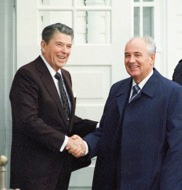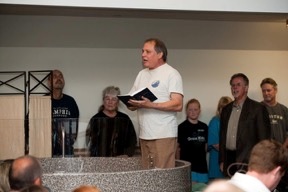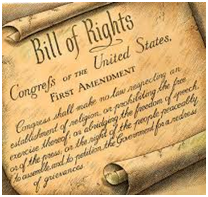
“A Piece of My Mind”
September 2022 Newsletter
Advancing Christian Faith and Values,
Defending Religious Liberty for All,
Supporting Civility and the Common Good
through Preaching, Teaching, Writing, Activism and Reasoned Conversations

Vin Scully
(1927 – 2022)
 The “Voice of the Dodgers”
The “Voice of the Dodgers”
A devout Christian and a man of humility who exuded reason and fairness and brought human warmth to Los Angeles for almost 60 years.
He made Los Angeles a better place to live.
Mikhail Gorbachev
(1931 – 2022)
 “The Last True Believer”
“The Last True Believer”
Gorbachev was the last leader of the Soviet Union who really believed in that ideology. It just needed some major reforms. But his reforms led to the end of the Union. With Ronald Reagan and Pope John Paul II, he goes down as a consequential (for good) leader of the last half of the 20th Century.

Vin Scully leads the fans in singing “Take Me Out to the Ballgame”
“Goodnight, everybody!”
2016 – Dodger Baseball’s legendary announcer Vin Scully, 88, will sign off for the last time in a few days, after 67 seasons as “The Voice of the Dodgers.”
When Vinny turned 80 in 2007, sportswriter Paul Oberjuerge wrote of him. I was fascinated by how his characterizations of Scully could compare with ministers—my career. How do we preachers measure up to Vinny?
• Vinny has “relentless goodwill” and contagious love for the game. He makes every game seem important and convinces you of the same. How many times haven’t I heard him say late in the game, “Good ball game!” You actually don’t mind hearing him speak for three hours (no call here for three-hour sermons, but do we convey each sermon is important and worth a listen?).
• He is personable and free of pretense and ego. He is pleasant and reassuring. He is smart, but never comes across as a “know it all.”
• He makes his message personal. It’s as if you, the listener, are the important one and he has invited you to “pull up a chair” so he can tell you about the game. Do people feel such intimacy with our sermons?
• He doesn’t follow fads and never uses jargon. That’s a challenge to us preachers, in whose trade there’s always a new fad to talk about or new lingo to use to show others we know something they don’t.
• He can be critical without being irritating—like it really hurts him to report hooliganism at the park or a player’s excessive aggression.
• When you meet him you feel he likes you as much as you like him.
• He conveys a sincere feeling of gratitude to God while knowing that baseball’s good times won’t last forever. “If you want to make God smile, tell him your plans.”

The breadth of this snapshot of the Universe is likened to having a grain of sand at arm’s length.
‘The new Webb telescope, in orbit around the sun 1 million miles above Earth and four times the distance to the moon, is able to penetrate the universe as nothing before it could do—taking us toward the beginning of time. To look into the sky is to look into the past. When I glimpse the sun, I don’t see the sun that “is” but as it “was” eight minutes ago.
The Bible asks and answers the question, “How can God, the Creator of such vastness, have any interest in me?” (Psalm 8 from the King James Version)
O Lord, our Lord, how excellent is thy name in all the earth!
who hast set thy glory above the heavens…
When I consider thy heavens, the work of thy fingers,
the moon and the stars, which thou hast ordained;
What is man, that thou art mindful of him?
and the son of man, that thou visitest him?
For thou hast made him a little lower than the angels,
and hast crowned him with glory and honour.
Thou madest him to have dominion over the works of thy hands;
thou hast put all things under his feet…
How excellent is thy name in all the earth!
 Taking Our
Taking Our
Christian Baptism Seriously
“We were all baptized by one Spirit so as to form one body—whether Jews or Gentiles, slave or free—and we were all given the one Spirit to drink.” – 1 Corinthians 12:13 NIV
This baptismal service (“yours truly” officiating) dates back to 2011. After considering many baptismal options, Grace Community Church in Seal Beach, California uses one of these: (1) this portable baptistry or (2) the Pacific Ocean one block away!
Our church practices a mode of immersion baptism known as “Trine Immersion” (a triple immersion). This mode is easily traceable back to the post-apostolic church (early 2nd Century and later). Thus, we need this kind of baptistry (though on rare occasions we have baptized by pouring water over the head of the candidate—which also is historically based).
Baptisms in the baptistry take place during a Sunday morning service. Baptisms in the ocean take place when the water is nice and warm.
Our church’s Elder Board once received a request that we OK a baptismal service in a backyard swimming pool, because the candidates for baptism didn’t want their baptism to identify them with the church. The Board wisely and rightly said NO! Read James Packer’s lesson excerpt:
Baptism has social implications. Involvement in the “body life” of mutual sympathy and service for Christ must be the rule for all the baptized.
Isolationism in church—sitting apart, not getting acquainted, dodging responsibility, and so on—is often condemned as denying the meaning of the Lord’s Supper. We need to see that it denies the meaning of baptism too, and just as drastically. Is that clear to us now? Are we making it a matter of conscience that by active love of our fellow-Christians we should show that we know what our baptism means?
– James Packer, Growing in Christ
Message of the Month –
A Lesson from the Travails of “Hillsong”
My Jesus, my Savior
Lord, there is none like You
All of my days I want to praise
The wonders of your mighty love
My comfort, my shelter
Tower of refuge and strength
Let every breath, all that I am
Never cease to worship you.
– “Shout to the Lord” by Darlene Zschech
Hillsong Worship (1994)
This song instantly became a favorite of mine! And here are just a few more Hillsongs that have ministered to me and to many others in worship services:
What a Beautiful Name
Cornerstone
Mighty to Save
This I Believe
Here I Am to Worship
How Great Is Our God
Mighty to Save
“Hillsong blessed believers with wonderful songs and stood as an example of service to its community” – Stephen Strang. But alas, the ministry known as “Hillsong,” which exploded from its start in Australia and became a wide-spread church phenomenon, has fallen on hard times.
Details are not hard to find and won’t be put forth here. Flamboyant pastors, autocratic leadership, powerful positions, multiple megachurches—all have their perils. I personally wouldn’t join any church body that calls its leader “Global Senior Pastor” nor a church ruled by an autocratic pastor rather than led by a qualified group of elders. *
The question I raise for now is this:“Should the failings of a movement and/or its leaders call for rejection of its music—worship music that has had a worldwide impact even greater than Hillsong itself?”
Some Christians think so, and I understand. It’s a form of the “guilt by association” argument. To sing the music is to think of the movement that produced it. To those persons, the singing is at the very least unedifying.
The church in Corinth asked the Apostle Paul about “foods sacrificed to idols.” How is it possible for Christians to please God by eating foods dedicated to idols? Paul goes to the heart of the matter (1 Corinthians 8:7): “Some are still so accustomed to idols that when they eat such food they think of it as having been sacrificed to an idol, and since their conscience is weak, it is defiled.”
I might paraphrase, “Some people think of Hillsong’s flaws every time they sing one of Hillsong’s songs—they can’t separate the two in their minds. Thus, singing such songs does not benefit them spiritually.”
I can remember (yes, I’m old enough!) when electric (amplified) guitars were a big issue in churches. How can a church allow these guitars into worship when they remind us of acid rock and various debaucheries? Should we teach on this to mature people’s thinking or should we create prohibitions to protect those who judge until the last old-timer goes to Heaven?
So what’s a church to do? Here are four issues to think about:
First, Paul calls the consciences of these people “weak.” For at least three reasons, a Christian shouldn’t want to manifest a weak conscience:
(1) A linkage between idols and food (or between Hillsong’s wrongs and songs) isn’t really there objectively and shouldn’t be there subjectively in our minds (1 Corinthians 8:1-8).
(2) A perpetually “weak” Christian limits his capacity to enjoy things in God’s world that God is actually able to bless (1 Timothy 4:4-5).
(3) A “weak” Christian is unable to follow Paul’s ministry flexibility of “being all things to all people”—weak with the weak, without law to those without law, etc. (1 Corinthians 9:19-23).
But secondly, the church needs to be sensitive to those who can’t (yet!), in their own minds, separate the food from the idol (the music from its source).
Third, Christians shouldn’t be static in their minds. They should grow from “weak” thinking to “strong” thinking. The church that ministers to the “weak” only by protecting them and not by challenging them to grow in their thinking is failing its duty to them. If the people of a congregation have the same hang-ups year after year over issues where they should be free to decide rather than be bound by rules, that congregation is static in its thinking and not growing in the freedom of Christ.
Fourth, I don’t think Paul would tolerate having weak theology, with its condemnations and rules, control the church’s ministries and direction.
So my counsel to a congregation where some are troubled in conscience over Hillsong music might be (1) protect these people for a period of time, perhaps by temporarily not singing the songs in corporate worship (NOTE: a church with multiple worship services has an ideal situation for handling this—it can stop the use of certain songs in one service and continue them in others), (2) teach on Christian liberty and challenge people to follow the open thinking the Apostle Paul gives, and (3) set a goal on when singing the songs can resume.
For biblical instruction on the kind of issues raised, read Romans 14:1-15:13 and 1 Corinthians 8-10. Keep in mind that Romans and 1 Corinthians deal with very different issues but offer similar principles and solutions.
For helpful reading about the Hillsong controversies: “What’s behind the bad press about Hillsong?” (Chris Friend) and “Lessons from the Hillsong Controversy” (Stephen Strang) from the July-August 2022 issue of Charisma.
* A church can be led by a truly empowered (not a rubber stamp) elder board and at the same time have pastoral leadership with considerable authority. The key is that the authority is delegated by the board (usually in well-written job descriptions, but also in bylaws and board motions) and accountable to the board, which in turn fulfills its fiduciary duties to the church. The larger a church gets, the greater the need for delegated authority. Only very small churches can be governed by pure congregational government, and they will stay small if they insist on operating that way.
Even a quality elder board (which I think is more biblically supportable than other forms of church government) can’t do all the governing in a larger church. Its members will burn out if it does not delegate and allow qualified and accountable individuals to lead. The elders should decide major issues and big expenditures and pastors and other staff should decide week-to-week, month-to-month and even year-long matters. For an excellent study of church governance: Wayne Grudem, Systematic Theology (2nd edition) pp. 1114-1175.
“Ceremonies Sent from God that Help Us Worship”
– 7th Essay on Worship for 2022
Human beings are incurably ceremonial, and that’s fine!
At the Naval Weapons Station in Seal Beach, California I offered a prayer at the changing of the command. I prayed to dedicate a new bridge and a new firehouse and, yes, a parking structure for the LA County Courthouse in Long Beach. All these events were ceremonies. I even prepared and led a ceremony once for the cleansing of a hotel room where the last guest had killed himself!
And we have religious ceremonies! We have weddings, funerals and memorials, baby dedications, dedications of new buildings and ministries.
Scripture itself teaches certain ceremonies. Passover, Pentecost and the Day of Atonement are featured ceremonies in the Old Testament. The New Testament speaks of anointing the sick with oil (James 5:14-16), washing the feet of Jesus’ disciples (John 13:1-17), and laying on of hands for Spirit empowerment (1 Timothy 4:14) or special ministry (Acts 13:3).
But let’s focus on two highly important ceremonies God has given to the church and provided guidance in our doing of them—BAPTISM and COMMUNION (the Eucharist). Here are 10 Facts for us to know and heed:
Fact #1 – Baptism and Communion may be called either “ORDINANCES” or “SACRAMENTS.”
What is a “Sacrament”?
A holy ordinance instituted by Christ; wherein, by sensible signs, Christ and the benefits of the new covenant, are represented, sealed, and applied to believers. (Westminster Shorter Catechism, Q&A 92)
I can use either word “ordinance” (something ordered by the Lord) or “sacrament.“ I prefer “sacrament” because (1) I believe God is uniquely present and graciously ministering to us in these rituals, and (2) I think both baptism and Communion have been wrongly minimized in many churches. In the Sacraments, God takes ordinary practices and leads us to extraordinary truths and benefits.
Fact #2 – Sacraments may be explained with three words:
“SYMBOL” – represents a saving work of God. (But never should we think of Baptism and Communion as “just symbols” or “only symbols.”)
“SIGN” – points to a saving work of God. (Without the sign, you may pass over it and miss it)
“SEAL” – confirms the saving work of God. (Like a handshake seals the deal)
Fact #3 – The Sacraments have three features: the OUTWARD SIGN, the INWARD REALITY, and the WORD of GOD (“Words of Institution”) that by the Spirit brings the sign and the reality together into a DIVINE EVENT.
What makes Baptism different from taking a dip in the pool?
Or Communion different from eating food samples at Costco?
Answer: the Word of God, which connects the outward sign to the inward reality. “I baptize you in the name of the Father and of the Son and of the Holy Spirit” or “This is my body, given for you” and “This is my blood of the covenant, poured out for many.”
Fact #4 – The Sacraments give a BOOST to our FAITH—God seals his promises to us through visible signs.
With the disciples, we need to say to Jesus, “Lord, increase our faith!” Admit it—our faith often needs a crutch! God understands the brittleness of our faith. So, through signs that we hear, see, feel, smell, and taste, God lifts our hearts to spiritual realities so we might perceive them by faith.
Fact #5 – The Sacraments should be seen as “means of grace” – avenues whereby God extends his grace to us. But don’t make an error in understanding this.
Error #1 – There are no other “means of grace.”
In his excellent Systematic Theology, Wayne Grudem explains that God uses many ways to give more grace to Christians in addition to baptism and communion: teaching of the Word, prayer for one another, worship, discipline, giving, spiritual gifts, fellowship, evangelism, ministry to one another.
Error #2 – They are automatic and effective, even if faith is absent.
No, Baptism is not like a car wash, and Communion is not like a vaccine.
Error #3 – Baptism and Communion are good works we do for God.
No, they are good works God does for us. Just as we receive the gift of Christ, so we receive baptism and receive Jesus’ body and blood. God in his sovereign grace has chosen to bestow spiritual benefits on us through tangible signs he has designed to bless and enrich our faith.
Fact #6 – The Sacraments can be signs of JUDGMENT instead of signs of grace (I Corinthians 11:27-32).
The Corinthian Church, Paul’s spiritual problem child, managed even to mess up Communion by turning its Love Feasts into times of selfish gluttony and drunkenness. So Paul warned the church of God’s discipline.
Abuse of Communion can bring discipline from God. It is no ordinary table that we are approaching.
Today Roman Catholic leaders who would deny the Eucharist to Catholics who actively promote abortion rights are accused of “weaponizing” the Eucharist. In reality, they are mercifully warning of God’s judgment.
Fact #7 – The Sacraments connect us to the PAST (I Corinthians 11:26).
Staying in touch with our spiritual roots is becoming a lost practice. Baptism and Communion help correct that. In baptism we connect with our Lord’s baptism, obedient life and suffering. In Communion, Jesus said, “This do in remembrance of me” (1 Corinthians 11:26). The Communion Table is a vivid reminder, a spiritual time machine, that sets us before the Cross to ponder Jesus’ sacrifice and its meaning to us.
Fact #8 – The Sacraments connect us to CHRIST and to his CHURCH
(I Corinthians 12:13; 10:17).
Baptism is the usual entryway into the life of the church. “By one Spirit we are all baptized into one body…” (1 Corinthians 12:13).
 Communion binds us together by the Spirit of God (1 Corinthians 10:17). I prefer to express this with a “common loaf” if at all possible. Breaking bread with my brother or sister is not privatistic like eating a tiny morsel of bread with my eyes closed can be.
Communion binds us together by the Spirit of God (1 Corinthians 10:17). I prefer to express this with a “common loaf” if at all possible. Breaking bread with my brother or sister is not privatistic like eating a tiny morsel of bread with my eyes closed can be.
Fact #9 – Baptism is our Sacrament of Initiation. Communion is our Sacrament of Continuation.
Baptism is God’s appointed sacrament to launch us on the road as a disciple of Christ. It is “once for all” – never to be repeated. We start the journey once.
Communion is our continuing sacrament of renewed fellowship with Christ in the presence of one another. When we fall off the spiritual pathway and get back on, we don’t return to the beginning. We continue at the Lord’s Table.
New Christians should quickly move on from baptism to nurture the good habits that build our relationship with a Christian community (Acts 2:41-42). This includes devoting ourselves to “the breaking of the bread.”
As a “continuing sacrament,” Communion should be frequent, even weekly.
Fact #10 – The Sacraments point us to the FUTURE—our complete salvation (Mark 14:22-25).
Our baptism initiates our citizenship in the coming Kingdom. By it we take our “oath of citizenship” as we call on the Lord (Acts 22:16; Romans 10:9-10).
Jesus linked Communion with the future: “I tell you the truth, I will not drink again of the fruit of the vine until that day when I drink it anew in the kingdom of God” (Mark 14:23-25).
I urge us all to elevate our understanding of the Sacraments—God’s enabling, uplifting gifts to his church. I pray our worship will always be enhanced whenever we rejoice with those who are baptized and partake at the Lord’s Table with all the Faithful.
Next Issue: “Worship Beneath the Cross of Jesus”
Religious Liberty Vigilance –
A Good Year in Court for Religious Liberty
 “Congress shall make no law respecting an establishment of religion, or prohibiting the free exercise thereof, or abridging the freedom of speech, or of the press; or the right of the people peaceably to assemble, and to petition the Government for a redress of grievances.”
“Congress shall make no law respecting an establishment of religion, or prohibiting the free exercise thereof, or abridging the freedom of speech, or of the press; or the right of the people peaceably to assemble, and to petition the Government for a redress of grievances.”
—The First Amendment
In its session that ended in June the U.S. Supreme Court rendered several decisions that resonate with First Amendment guarantees.
Shurtleff v. Boston – the court ruled unanimously that the City of Boston was wrong in banning the flying of a Christian flag on a pole that was otherwise available to other community groups for flying a variety of flags. I found it interesting that this decision was opposed by Americans United for Separation of Church and State but supported by the American Civil Liberties Union.
Retiring Justice Stephen Breyer wrote, “When the government encourages diverse expression — say, by creating a forum for debate — the First Amendment prevents it from discriminating against speakers based on their viewpoint.”
Ramirez v. Collier – the court ruled 8-1 that a convicted murderer had the right to have his pastor present to place his hands on him and pray out loud at the time of execution.
Chief Justice John Roberts wrote that there has been a long history of allowing pastors to deliver prayers at executions and “lay hands” on the individual being executed. He also noted that Texas had not shown a compelling state interest for prohibiting the prayer (as required by the Religious Land Use and Institutionalized Persons Act that protects the religious rights of prisoners).
Carson v. Makin – the court ruled 6-3 that the State of Maine violated the Constitution by preventing families from using state aid to send children to religious schools while it supplied aid for children to attend other private schools.
Chief Justice John Roberts wrote, “Maine’s ‘nonsectarian’ requirement for its otherwise generally available tuition assistance payments violates the Free Exercise Clause of the First Amendment.”
Kennedy v. Bremerton School District – the court affirmed 6-3 the right of Coach Joseph Kennedy to offer personal prayer at the 50-yard line after a game. The court did not find anything coercive about his action that would make players feel compelled to pray.
Justice Neil Gorsuch wrote, “That the First Amendment doubly protects religious speech is no accident. It is a natural outgrowth of the framers’ distrust of government attempts to regulate religion and suppress dissent.”
In this case, I’ve imagined the team-building practice of a coach joining the players once a week for a lunch in the school cafeteria. The coach briefly bows his head and prays silently before eating lunch (a common biblical practice). Would the “religion police” come down on this coach for creating a scene that might make non-religious students feel uncomfortable or might compel others to pray who otherwise wouldn’t have done so?
Civility in Difficult Times
“People who cannot restrain their baser instincts, who cannot treat one another with civility, are not capable of self-government … without virtue, a society can be ruled only by fear, a truth that tyrants know all to well.” — Charles Colson
A Very Under-Reported Massacre
 It was barely a blip on the news in America. On Pentecost Sunday (June 5) two gunmen entered worship services at St. Francis Catholic Church in the town of Owo in southwestern Nigeria.
It was barely a blip on the news in America. On Pentecost Sunday (June 5) two gunmen entered worship services at St. Francis Catholic Church in the town of Owo in southwestern Nigeria.
BBC News reported that at least 50 bodies had been taken to two hospitals in the town.
In May 2022, a young Nigerian Christian woman was beaten to death by a mob for posting the message “Jesus Christ is the greatest. He helped me pass my exams.” Her words were to some an offence punishable by death.
“Open Doors USA,” an organization that tracks religious persecution, has documented the killing of 4650 Christians in Nigeria in 2021.
[Most of this information comes from “The Christian Martyrs of Nigeria,” in The Wall Street Journal (June 8, 2022). The writer, David Curry, is President of “Open Doors USA” and also is a member of the U.S. Commission on International Religious Freedom.]
 Attacks on pro-life counseling centers have been in the news since the U.S. Supreme Court returned the debate over abortion laws back to the states.
Attacks on pro-life counseling centers have been in the news since the U.S. Supreme Court returned the debate over abortion laws back to the states.
Would you like to read the most recent (August 28) update of my essay on “The Second Coming of Christ and the Rapture of the Church” (an expansion of three essays in recent newsletters)? You may access the essay at:
If you would like a PDF copy of the essay, please request it at: donaldshoemakerministries@verizon.net and I will send you a copy via email. I recommend the PDF version for reading, printing and sending.
Thank you for your interest!
www.donaldshoemakerministries.com
Don has been a member of the clergy in the Long Beach, California area since 1970. He now serves as Pastor Emeritus of Grace Community Church of Seal Beach (where he was senior pastor 1984-2012) and as Senior Chaplain of the Seal Beach Police Department (2001+). He previously was an assistant professor of Biblical Studies at Biola University (1976-84) and chaired the Social Concerns Committee in the Fellowship of Grace Brethren Churches from 1985 to 2019.
His graduate work includes a Master of Divinity from Grace Theological Seminary, a Master of Theology from Fuller Theological Seminary with a concentration in Christian ethics, and a Doctor of Ministry from American Baptist Seminary of the West (now Berkeley School of Theology) with a concentration on the Charismatic Movement. His law school studies included a course on the First Amendment. He and his wife Mary have been married for over 55 years. They have two children and six grandchildren.
© 2022 Donald P. Shoemaker

